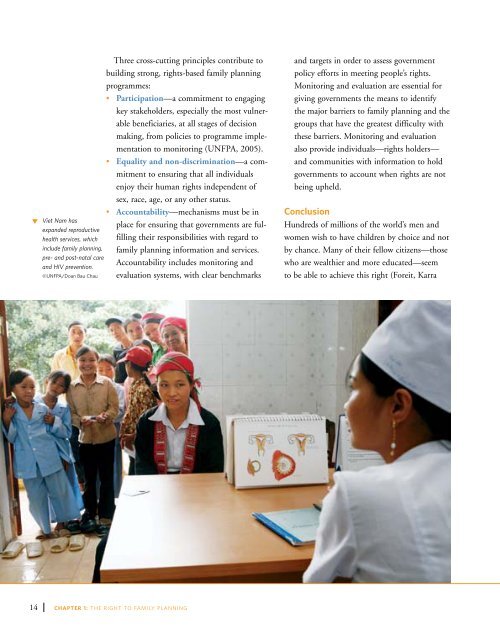State of World Population 2012 - Country Page List - UNFPA
State of World Population 2012 - Country Page List - UNFPA
State of World Population 2012 - Country Page List - UNFPA
You also want an ePaper? Increase the reach of your titles
YUMPU automatically turns print PDFs into web optimized ePapers that Google loves.
t Viet Nam has<br />
expanded reproductive<br />
health services, which<br />
include family planning,<br />
pre- and post-natal care<br />
and HIV prevention.<br />
©<strong>UNFPA</strong>/Doan Bau Chau<br />
Three cross-cutting principles contribute to<br />
building strong, rights-based family planning<br />
programmes:<br />
• Participation —a commitment to engaging<br />
key stakeholders, especially the most vulnerable<br />
beneficiaries, at all stages <strong>of</strong> decision<br />
making, from policies to programme implementation<br />
to monitoring (<strong>UNFPA</strong>, 2005).<br />
• Equality and non-discrimination—a commitment<br />
to ensuring that all individuals<br />
enjoy their human rights independent <strong>of</strong><br />
sex, race, age, or any other status.<br />
• Accountability—mechanisms must be in<br />
place for ensuring that governments are fulfilling<br />
their responsibilities with regard to<br />
family planning information and services.<br />
Accountability includes monitoring and<br />
evaluation systems, with clear benchmarks<br />
and targets in order to assess government<br />
policy efforts in meeting people’s rights.<br />
Monitoring and evaluation are essential for<br />
giving governments the means to identify<br />
the major barriers to family planning and the<br />
groups that have the greatest difficulty with<br />
these barriers. Monitoring and evaluation<br />
also provide individuals—rights holders—<br />
and communities with information to hold<br />
governments to account when rights are not<br />
being upheld.<br />
Conclusion<br />
Hundreds <strong>of</strong> millions <strong>of</strong> the world’s men and<br />
women wish to have children by choice and not<br />
by chance. Many <strong>of</strong> their fellow citizens—those<br />
who are wealthier and more educated—seem<br />
to be able to achieve this right (Foreit, Karra<br />
14 CHAPTER 1: THE RIGHT TO FAMILY PLANNING
















